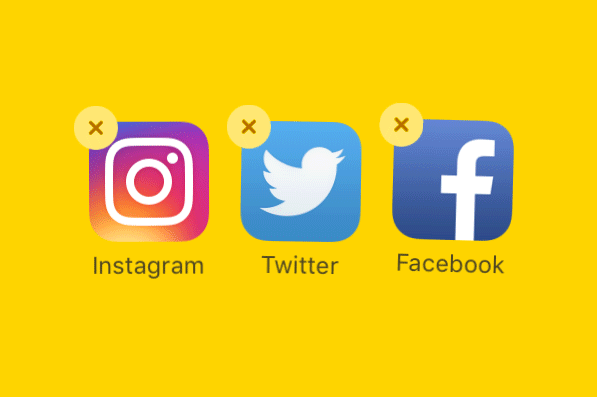🦄 vol. 38
sash chats about the rise of authentic social media 🥸
be real 🥸
In vol. 11, I took a look at the role that Instagram (knowingly) has on harming teen mental health. Let’s cut the BS: Our timelines are filled with unattainable lifestyles, unrealistic physical attributes, and of course, 24/7 happiness. Most of us won’t admit it, but it’s easy to feel the pressure to live up to these unattainable expectations that flood our feeds.
Who’s really incentivised? 🤑
While the harmful effects of this environment are well known and documented, it’s important to understand which stakeholders stand to benefit from social media in its present form:
📺 The platforms: If the content drives up user numbers and/or activity, the platforms stand to benefit. Why? More people and time on a platform = more advertising revenue 💰.
🛍 Brands and influencers: Influencers (an estimated ~$16 billion industry 🤯) have been used as an effective channel to help brands reach and communicate to their desired audience. Generally speaking, reach and engagement are key metrics used to determine which influencers get the biggest gigs.
📲 Editors and app stores: While the platforms continue to invest heavily in their in-app editing capabilities, the obsession with posting the perfect content has naturally given rise to whole new wave of specialised editing apps (i.e. Facetune and their ironic value proposition). Of course, your phone’s app store takes a cut from these transactions (💵 paid for downloads and in-app purchases) too.
Smoke and mirrors? 🤡
As an everyday social media user, we are just the end consumers. What we don’t see is the (not-so-perfect) reality behind-the-scenes: the faking; the criminal activity; the obsession and hours spent editing; the masked sadness… Trust me, I’ve (almost) seen it all.
Cue: BeReal 🥁
BeReal was launched in France in 2020 by Alexis Barreyat (a former video producer at GoPro) who felt let down by the farce of social media. The story goes that after spending time with a bunch of influencers, Barreyat soon realised that their real lives were not as amazing as their social feeds suggested.
Haven’t heard of BeReal before? I got you. 🤝
⚙️ Functionality: With BeReal, every day at a random time, all users are notified to take and share a pic with their friends. However, there are a few caveats…
Unfiltered pics are captured with your front and back camera simultaneously. And sorry, you can’t upload a pic from your camera roll.
Users have a 2 min window to share a pic, and if you miss it, it’ll publicly shame you for being late.
It also exposes the amount of attempts you had at taking your picture!
📈 The numbers: While it’s said to be blowing up on US college campuses (much like Facebook once did), here’s a few interesting stats from the past ~90 days, as per Apptopia:
~11.9 million app downloads (iOS + Android), with ~63% coming from the US and UK.
~2.4 million daily active users (DAUs). For context, Instagram has 1.2 billion DAUs.
The average user currently spends about ~8 mins on the app every day (surprisingly on par with Instagram’s).
💰 Monetisation: Like its social media elders, BeReal has gone the route of growing its user base first, and figuring out a revenue model later. Given the fact that they recently raised a Series B round (~$600 million valuation) in May, I have no doubt that there’s a monetisation plan in the pipeline. An ads revenue model like Instagram's may be the next step here if they're able to sustain the amount of time that the average user spends on the platform as their user base grows. In a perfect world, if you have 2 mins to post, the other 6 would be monetised.
🤩 My experience: I succumbed to the hype and downloaded the app, and I must say, I’ve been pleasantly surprised. I’ve opted to only add my really close friends (something I kinda wish I did with some of my other social media accounts) and I’ve enjoyed seeing that I’m not the only person stuck behind a desk in track pants on most days. 😂.
BeReal, sometimes? 🧐
But look, despite the app’s intentions to get users to post “unfiltered” content, I’ve yet to see a pic of someone on the 🚽. Users can still choose to not share a pic when notified by the app. This likely means that people are also being selective about when they’ll BeReal... or not.
What’s in store? 🔮
Here are some trends to chew on:
Gen-Z’s prefer stronger connections: Insider (US) recently ran a survey which found that image sharing apps like BeReal and Locket are helping Gen-Z’s connect with close friends, and are preferred to the likes of Instagram and Facebook.
Existing social media platforms are also creating safer spaces: Instagram launched Close Friends and Twitter recently launched Circle.
Advertising agencies want natural: Ogilvy UK recently announced that it will no longer work with influencers who digitally distort or retouch their photos. Worth noting that the announcement received its fair share of criticism too.
Creators keep it genuine: We’ve seen the rise of creators such as Gugulethu Nyatsumba (#YouTubeBlackVoices Class of 2022) who champions unfiltered content about mental health.
Fashion brands are trying to be more inclusive: We’ve seen the likes of Rihanna’s SAVAGE x FENTY represent plus-size models.
I don’t know about you, but I’m sensing a shift towards authenticity - and I’m here for it. Although not quite ready for the 🚽 pics.
sash
karl enjoyed watching these problematic founders’ talks before the hammer had fallen for them
sash loved this pod about amazon’s innovative “pr-faq” product development process






👏🏾👏🏾👏🏾
Okay I’m into this 🙌🏾